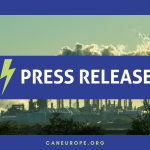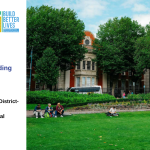The president of the European Commission, Ursula von der Leyen, proposed the new target in her state of the (European) Union address at the European Parliament yesterday. She said “the Western Balkans are the European Union” and called the region “a part of Europe, and not a stopover on the Silk Road”.
The European Commission has proposed increasing the new climate target for the EU from a previously set reduction of 40% by the year 2030 to at least a 55% reduction of GHG emissions compared to 1990 levels. Although the latest scientific data calls for a 65% reduction for a Paris-compatible pathway to preventing runaway climate change(1), this is positive news as it will steer policies, investment, big and small businesses as well as consumption patterns towards achieving climate neutrality by 2050.
Viktor Berishaj, Climate and Energy Policy Coordinator for Southeast Europe at Climate Action Network (CAN) Europe said: “All candidate, and prospective candidate countries, which are right now engaged in updating their NDCs(2) and drawing up their own NECPs(3), must match the EU’s new climate target as the guiding principle for not only their climate and energy policies, but for nothing less than a transformation of their economies and society. This will now be one of the key tests of the Western Balkans’ commitment to a future in the European Union, by including the same ambition into national policies.”
This should warn Western Balkan countries, whose emitters are yet to be subjected to a carbon tax, to stop betting on Chinese-financed coal plants
Von der Leyen emphasised that meeting this new target will create jobs and half air pollution, both priorities for the Western Balkans, too. But she also emphasised determination to ensure trade with the EU is fair by addressing carbon leakage through border carbon adjustment. This should warn Western Balkan countries, whose emitters are yet to be subjected to a carbon tax, to stop betting on Chinese-financed coal plants(4) – now.
“An assertive and ambitious European Union means stronger integration through the Energy Community(5), real energy transition from fossil fuels to clean, renewable energy – not fossil gas, and open, participative and just transition that leaves no one behind. The governments in the region should connect this new 55% goal to the growing public resistance at home to continued reliance on coal and dirty technologies and to record-breaking air-pollution. Now is the time to take up the challenge and contribute to the forthcoming Green Agenda(6) so it’s both for but also by the Western Balkans”, concludes Berishaj.
ENDS
Notes:
(1) Last year, the United Nations’ Emissions Gap Report evidenced that at the global level annual emission reductions of 7.6% between now and 2030 will be needed to reach the 1.5°C target of the Paris Agreement. Applying this reduction pace would require the EU to increase its 2030 target to at least 65%
(2) Nationally determined contributions The Paris Agreement requires each Party to prepare, communicate, and maintain successive nationally determined contributions (NDCs) that it intends to achieve. Parties shall pursue domestic mitigation measures, with the aim of achieving the objectives of such contributions.
(3) National Energy and Climate Plans: To meet the EU’s energy and climate targets for 2030, EU Member States, as well as candidate countries-members of the Energy Community, need to establish a 10-year integrated national energy and climate plan (NECP) for the period from 2021 to 2030; Introduced under the Regulation on the governance of the energy union and climate action (EU/2018/1999)
(4) EU-China leaders’ meeting: EU must do more to tackle legal breaches by Chinese companies in Europe, say civil society organisations https://bankwatch.org/press_release/eu-china-leaders-meeting-eu-must-do-more-to-tackle-legal-breaches-by-chinese-companies-in-europe-say-civil-society-organisations
(5) The Treaty between the EU and its neighbours working to integrate their energy markets https://www.energy-community.org/
(6) Joint NGO proposals on the Green Agenda for the Western Balkans.
Contact:
Viktor Berishaj, Climate and Energy Policy Coordinator for Southeast Europe, CAN Europe, viktor@caneurope.org
Stevan Vujasinovć, Communications Coordinator for Southeast Europe, CAN Europe, stevan@caneurope.org



